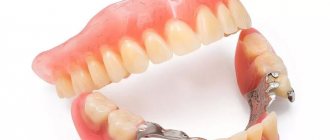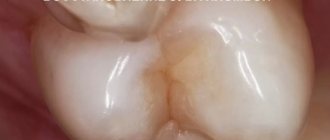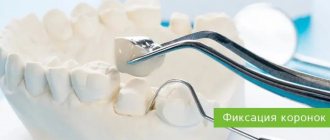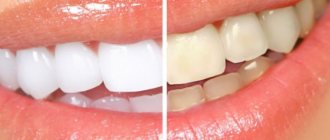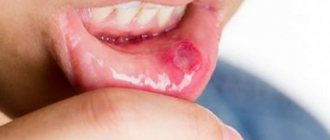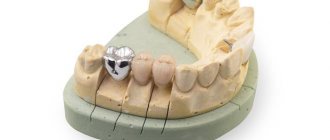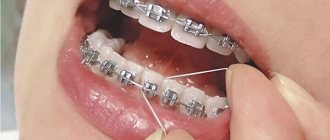Almost all patients of orthopedic dentists experience difficulties after prosthetics. In the first few days, sometimes weeks, the discomfort is quite noticeable, since there is a foreign object in the oral cavity. But the adaptation period can be made easier if you ask your dentist in advance how to quickly get used to removable dentures. Experts have developed several recommendations that will help you go through the period of adaptation to orthopedic structures with less difficulty.
Dry mouth or increased salivation
A feeling of dryness or, on the contrary, increased salivation occurs due to the adaptation of the mucous membranes to a foreign body. If the design is made correctly, the discomfort quickly passes. If your mouth is dry, you should drink water more often and rinse, but do not use alcohol solutions. It is worth limiting the consumption of tea, coffee, and at least temporarily giving up smoking. You need to get rid of dryness quickly, otherwise your gums will be injured.
Excessive salivation is a reaction to a foreign body in the mouth, to constant contact with the mucous membrane. It goes away on its own in a few days. You can simplify the adaptation process for the mucous membrane by rinsing with decoctions of chamomile, oak bark or sage, or solutions recommended by your doctor.
Stages of professional care
In modern dental clinics, professional teeth cleaning is carried out according to the following algorithm.
- The doctor uses ultrasound to remove mineralized deposits on the teeth. The stone, under the influence of ultrasonic vibrations, loosens and begins to chip. If necessary, subgingival cleaning is performed. For this procedure, curettes are used, special devices that allow you to manually scrape out deposits.
- Then, using an air abrasive device, the dentist removes soft plaque from hard-to-reach places.
- Small round particles of soda under the pressure of water quickly clean off deposits on the teeth, while making them 1-2 shades lighter. Soda powder does not scratch the enamel and practically does not injure the gums.
- Using a micromotor, special paste and rubber attachments, the dentist grinds fillings and teeth. Multiple rotating brushes effectively clean the pits of crowns and help prevent future plaque build-up.
- The surface of the teeth is treated with a special mineralizing varnish with fluorine, calcium and phosphorus. This substance stays on the teeth for several days. During this time, the enamel absorbs beneficial microelements.
Some cleaning steps may be added or omitted depending on the patient's oral health. After professional cleaning, the dentist teaches the patient daily oral hygiene techniques and the selection of teeth and gum care products. The entire procedure usually takes no more than an hour.
Professional toothpaste ASEPTA Remineralization will help restore the upper layers of enamel after brushing. This product with high concentrations of hydroxyapatite and thermal mud helps strengthen teeth and gums and reduces sensitivity. The optimal degree of abrasiveness of the paste allows you to maintain the natural whiteness of teeth without damaging the enamel and gums.
Problems with diction
After prosthetics, there is less space in the mouth, which is why the patient may have problems with diction at first: the tongue does not have enough free space, sounds are distorted. To cope with this faster, you will need training. To do this, you can read aloud, pronounce individual complex sounds, and do tongue exercises. The more actively the tongue “works” immediately after prosthetics, the faster the adaptation will take place and normal diction will be restored. When getting used to speaking correctly, you need to make sure that when pronouncing sounds, saliva does not fly from your mouth. A good workout would be tongue twisters that are spoken slowly, making sure that the pronunciation and articulation are correct.
Talk out loud more
Without teeth, the tongue in the oral cavity is much more spacious, so after the appearance of a prosthesis in it, it becomes more difficult for a person to pronounce many sounds. To quickly restore diction:
- try to talk as much as possible, read aloud, loudly and in a whisper;
- practice pronunciation by repeatedly repeating words with sounds that are difficult for you, for example s, zh, r;
- say tongue twisters repeatedly several times a day;
- do articulatory gymnastics.
Such training will help you quickly learn to speak clearly with a removable denture.
Eating
Chewing skills with a newly installed denture need to be developed gradually. This does not mean that you need to switch to broths, purees and cereals. On the contrary, you need training with a gradual increase in load. The hardness of the products is increased gradually. It is better to start eating vegetables and fruits in small pieces, chewing them thoroughly. They get used to biting food in the same way - gradually, starting with softer foods and moving on to hard foods. You need to chew and bite carefully: it is important not to damage or injure the gums, and to control the load on it.
After installing a removable denture, the patient may feel that food is deprived of its usual taste, it has become less pronounced. This occurs because the base of the structure covers the palate where the tactile receptors are located. This does not affect the perception of taste in any way - taste buds are located on the tongue. The feeling that the taste of food has changed is associated with a foreign body in the mouth and quickly passes as you get used to it.
Do you have questions about removable dentures?
We will call you back within 30 seconds
+7
First week with dentures
If you are worried about having teeth removed or getting used to dentures, the experience of people who have been in the same situation will help you. So, in addition to expert advice, we asked denture wearers to share their experiences and advice.
How to prepare
- Find out detailed information about how your teeth will be removed.
“The dentist explained everything to me in detail,” says Greg, 57, who wears partial dentures on his upper jaw. “According to my dentist, most patients worry about pain during tooth extraction. But during the procedure, they usually feel only a little pain from the anesthesia injections. In addition, during the procedure the patient will hear sounds that may seem strange, but there should be no pain. The doctor explained to me how long I would feel weak and when it would go away. He told me what medications I could take after the procedure.”1
“Tooth extractions are different,” says Donna, 58, who wears a full denture on her upper jaw and a partial denture on her lower jaw. “In my case, it took three doctor visits.”2
- If you are nervous about having your teeth removed, try breathing deeply for a few minutes. This will help you calm down. Sit down and inhale slowly, counting the number of seconds it takes to inhale. Then exhale on the same count. Do this exercise as soon as you feel anxious.
“When I want to calm down, I do breathing exercises using a special app,” says Lucy, 56, who wears partial dentures in her lower jaw. “I did it before tooth extraction.”3
- Think about the future “I tried to think more about the end result, without focusing on the difficulties that arose in the process. I dreamed of smiling normally again,” says Karen, 52, who wears a partial denture on her upper jaw.4
- In addition to physical changes, you may experience strong emotions associated with tooth loss. “Having my teeth removed had quite a psychological impact on me, I don’t even know why,” says Lucy. "My brain was telling me something like, 'Hey, there's something missing in your body now.' Personally, the emotions I felt after having my teeth removed took me by surprise. It would be great if people were ready for this.”5
Eating
In the first week after getting dentures, you will need to make changes to your diet. Especially on the first day, when you feel pain after tooth extraction and learn to bite and chew food with dentures.
- Eating cold foods will help relieve gum pain. “The dental assistant told me to eat ice cream and sorbets to reduce the swelling of my gums,” says Tammy, 46, who wears lower partial dentures. “I ate them the first week after getting my dentures.”6
- Food should be soft and nutritious. “I made soups, puddings and mashed potatoes using a blender of various ingredients, as long as the food was soft,” says Lucy. “I couldn’t eat meat, so I ate a lot of legumes to make up for the lack of protein. They contain a lot of protein and have a soft consistency.”7
- Choose new ways to prepare your favorite dishes. “I changed the way I cook,” Tammy says. “I baked and steamed, rather than fried as usual. This makes the dishes softer.”8
- At first you will have to give up some of your favorite foods, but over time you will return to your normal diet. “That was the biggest challenge for me,” says Lucy. “I was worried whether the prosthesis would slide out while eating, whether I would be able to eat solid food. At first I couldn’t, but then everything became normal.”9
The first week after installation of dentures
Dentures feel different, and some people find them uncomfortable at first. For some people, dentures suit them right away, for others they don’t. In any case, at first you will feel them until you get used to the feeling of a foreign body in your mouth.
- “When I first put on dentures, I felt pretty weird,” says Greg, 57. “The first week it always felt like I had something in my mouth. The dentures made my gums hurt. Not very much, but still. I had to go to the dentist twice to have my dentures adjusted. Then I got used to them, and now everything is fine.”10
- Be prepared for the fact that it will take some time to get used to it, but don’t despair: everything will work out. “The feeling of something extra in my mouth went away after about a couple of months,” says Ed. “You'll have to be patient for a little while, but then you won't even realize you're wearing dentures.”11
Speech
At first, dentures may affect the way you speak. You may have a lisp or difficulty pronouncing certain sounds. This is completely normal and will go away as you get used to the dentures.
- "I don't think it's about the specific words," says Ed, 62, who wears a partial denture in his upper jaw. “I just kept thinking about the prosthesis. At first I began to speak more slowly. It was scary to speak at normal speed, because the thought was in my head: “What if the prosthesis comes off.”12
- Greg only told people he wore dentures if they couldn't understand his speech very well. “I would only tell people about prosthetics if they start asking questions and saying that they don’t understand me well. In that case, I would tell them that I just started wearing partial dentures and it is affecting my speech during the adjustment period.”13
- “I was aware that I didn't speak normally, so I read books out loud and practiced my speech,” says Debra, 58, who wears partial dentures in her upper jaw. This is a good way to relearn certain sounds. Practice speaking in front of a mirror - you will see that you look absolutely normal when you speak with dentures.14
Return to work and normal life
Check with your doctor about when you can return to work and normal life.
- “To get used to the prosthetics, I took a week off. The doctor said that it might take about a week to get used to it, so I decided to stay at home.”15
- Ed recalls that he was scared to communicate with friends. “Will they notice that I speak differently now?” he says. “The same concerns haunted me about communicating with colleagues. It was sitting in my head. Will they notice that my cheeks look different now? Will they pay attention to the way I talk now? But I made an effort and started communicating with people. As usual, the longer you put it off, the worse it gets. Just start talking to people again. Over time, you will get used to it and everything will become normal. Should you tell others that you wear dentures16
Whether you tell people that you wear dentures is up to you. The heroes of our stories had mixed feelings about this. You may not tell everyone this; By sharing it with your closest people, you can get support.
- "I told my sister and brother and it didn't feel awkward," Lucy says. “She said that I was going to the dentist next Thursday, and serious changes awaited me. I didn’t hide anything and there were no problems.”17
- "I didn't tell anyone," Ed says. “Except for your family.”18
- "I told my family," Karen says. “When my dentures were finally ready, I felt great joy. I think we can be open about this. And then, literally on every corner you can see advertisements for dental clinics that offer fillings, implantation, or ordering dentures. So I don’t think there is any need to be ashamed of prosthetics, because everyone knows about it.”19
- "I haven't confessed to anyone," says Leonard, 54, who wears a partial denture on his upper jaw. “I’m very afraid one day to leave the house and forget to put on my dentures. I don’t want my friends to see me without teeth, so I keep an eye on it.”20
Injuries
In the first days after installation, injured areas may appear on the surface of the gums: small wounds, abrasions, etc. They may appear due to improper chewing technique or sensitivity of the mucous membrane. Normally, the denture stops rubbing the gums within a few days. You can speed up this process by rinsing with antiseptic solutions and chamomile decoction.
If injuries do not go away over time, become more pronounced, or cause increasing discomfort, you should consult a doctor. The problem may lie in the design itself. The doctor will conduct an examination and correct the prosthesis. Usually one correction is enough for the discomfort to go away.
How to get used to prosthetics that cause pain?
When pain occurs, you shouldn’t endure it and wait for “everything to go away.” Contact your doctor immediately if you notice symptoms such as:
- rubbing gums when chewing;
- severe headache or toothache;
- spasms and pain in the jaws;
- bleeding in the mouth.
The dentist will determine the cause of such phenomena and, if necessary, correct the design.
If you follow the above tips, you will get used to the prosthesis much faster. Gradually, you will completely stop noticing it, and those around you will not even guess that your teeth are not your own.
Allergic reaction
It occurs very rarely, since all structural elements are made of hypoallergenic, biocompatible materials. It manifests itself as redness of the gums at the contact site; this area may itch and possibly burn. The unpleasant sensations do not go away and do not weaken, they can intensify, the gums look injured.
Allergy is a rejection of construction materials, which may be accompanied by nausea, malaise, and dizziness. It appears almost immediately after installation, disappears after some time if you remove it. There is no point in waiting for adaptation in case of allergies - the reaction will only intensify over time. To solve the problem, you need to find out which material in the structure you are allergic to and make a new prosthesis without using it.
What to do if the denture rubs the gums?
If the prosthesis begins to rub the gums, pain and discomfort begin, you need to evaluate how intense this pain reaction is.
If these are minor pain sensations: it hurts a little, aches a little, tingles, then you can wait 2-3 days, using pharmacy ointments for pain.
If these sensations do not go away within 2-3 days, or the pain intensifies, then you need to go to the doctor who made this removable denture. The doctor will look at your jaw and in those places where the prosthesis presses too much, he will adjust it and sharpen it so that in this place the prosthesis does not press through the mucous membrane. There may be one or several such corrections, depending on the sensitivity of the patient’s mucosa. Over time, these corrections stretch from one to two to three weeks.
Psychological aspect
Often the use of a prosthesis provokes psychological discomfort in the patient: it frightens him, it seems to him that complications have already arisen, and adaptation is not going well. To prevent such a problem from arising, you need the right attitude: a person must be prepared for the difficulties that may arise in the first days. It is important to take your time and understand that the body needs to get used to new conditions. The period of complete adaptation takes up to one and a half months on average, but the most noticeable discomfort disappears after 1-2 weeks if you wear the prosthesis constantly.
To get used to a removable denture faster, orthodontists at the Dentospas clinic recommend massaging the gums. You can do it yourself, it will improve blood circulation and tissue nutrition, and improve the condition of the gums. Massage is done provided that the surface of the mucous membrane is not injured and there are no open wounds on it. At first, to speed up adaptation, you can leave the prosthesis on at night (install it again after cleaning). This is safe (the gums and tongue hardly move during sleep) and allows you to increase the time of contact of the mucous membrane with the base of the structure.
What to do if the discomfort from wearing a removable denture does not go away?
At the initial stage of adaptation to the prosthesis, the gums may hurt a little. If the lower prosthesis rubs or the palate rubs with the prosthesis during the first stages of wearing a removable orthopedic structure, this is completely normal. However, if the problem persists, contact your dentist. If he finds that the denture is not adjusted correctly, replacement may be necessary, since a denture that does not fit the anatomy of your jaw can cause sores or even infections. If we are talking about the need for adjustment, then in one visit to the doctor you will solve your problems.
